In this e-weekly:
- Things You Will (Probably) Never Hear a Catholic Say (A bit of humor… [the smiling cat])
- Pope Francis Shares a Sweet Treat with Rome's Poor for Feast of St. George (Diocesan News and BEYOND)
- Listen to Catholic Radio (Helpful Hints for Life)
- Things You Will (Probably) Never Hear a Catholic Say (A bit of humor… [the smiling cat])
- Pope Francis Shares a Sweet Treat with Rome's Poor for Feast of St. George (Diocesan News and BEYOND)
- Listen to Catholic Radio (Helpful Hints for Life)
Catholic Good News
Receiving the Gospel, Serving God and Neighbor
PRAYER: Simple and Humble
“Humble yourself the more, the greater you are, and you will find favor with God..” –Sirach 3:18
Receiving the Gospel, Serving God and Neighbor
PRAYER: Simple and Humble
“Humble yourself the more, the greater you are, and you will find favor with God..” –Sirach 3:18
Dear friends in Christ Jesus,
You want to stay together? Pray together! You want your life in order and for things to go well? Put God at the center! How do I do all this? By praying: SIMPLY and HUMBLY.
Prayer is not rocket science; prayer is simple. Take any posture and open your heart to God. Don’t think, do! Speak to God, and listen to God. No more, no less. Simple.
God is humble. GOD is humble! God, who is the last one to have any reason to be humble, IS humble. God allowed us to kill Him on the Cross by our sins; and He is constantly among us under the humble appearance of bread in the Holy Eucharist. If God is humble, then you and I better be humble.
Humility is the acknowledgement of the truth; namely the truth that God is God and I am not. I need God. Who am I? A speck in the cosmos, but God loves the speck. Humility. Simply remember who you are and to whom you speak. Prayer is humble.
Now, yes right now, pray. Simply. Humbly.
Peace and prayers in Jesus through Mary, loved by Saint Joseph,
Father Robert
P.S. I have attached this week’s homily in written format below at the bottom.
P.S.S. This coming Sunday is the Fifth Sunday of Easter. The readings can be found at: https://bible.usccb.org/bible/readings/042824.cfm
P.S.S.S. For Sunday Readings with reflection please see end of e-mail.
You want to stay together? Pray together! You want your life in order and for things to go well? Put God at the center! How do I do all this? By praying: SIMPLY and HUMBLY.
Prayer is not rocket science; prayer is simple. Take any posture and open your heart to God. Don’t think, do! Speak to God, and listen to God. No more, no less. Simple.
God is humble. GOD is humble! God, who is the last one to have any reason to be humble, IS humble. God allowed us to kill Him on the Cross by our sins; and He is constantly among us under the humble appearance of bread in the Holy Eucharist. If God is humble, then you and I better be humble.
Humility is the acknowledgement of the truth; namely the truth that God is God and I am not. I need God. Who am I? A speck in the cosmos, but God loves the speck. Humility. Simply remember who you are and to whom you speak. Prayer is humble.
Now, yes right now, pray. Simply. Humbly.
Peace and prayers in Jesus through Mary, loved by Saint Joseph,
Father Robert
P.S. I have attached this week’s homily in written format below at the bottom.
P.S.S. This coming Sunday is the Fifth Sunday of Easter. The readings can be found at: https://bible.usccb.org/bible/readings/042824.cfm
P.S.S.S. For Sunday Readings with reflection please see end of e-mail.
Catholic Term
humility (from Latin humilitâs, which is from humilis “lowly, insignificant, on the ground”)
- the moral virtue that keeps a person from reaching beyond himself; the acknowledgement of the truth of who God is and who I am
[Religious humility recognizes one's total dependence on God; moral humility recognizes one's creaturely equality with others. Yet humility is not only opposed to pride; it is also opposed to immoderate self-abjection, which would fail to recognize God's gifts and use them according to his will.]
humility (from Latin humilitâs, which is from humilis “lowly, insignificant, on the ground”)
- the moral virtue that keeps a person from reaching beyond himself; the acknowledgement of the truth of who God is and who I am
[Religious humility recognizes one's total dependence on God; moral humility recognizes one's creaturely equality with others. Yet humility is not only opposed to pride; it is also opposed to immoderate self-abjection, which would fail to recognize God's gifts and use them according to his will.]
“Helpful Hints of Life”
Listen to Catholic Radio
You don’t simply learn Catholicism, you absorb it.
To do this you need to be surrounded with it.
Listening to Catholic Radio will help you do this.
Listen to Catholic Radio
You don’t simply learn Catholicism, you absorb it.
To do this you need to be surrounded with it.
Listening to Catholic Radio will help you do this.
Covenant Network
www.covenantnet.net
Covenant Network Catholic Radio
By the grace of Jesus in the Most Blessed Sacrament, we evangelize primarily through radio. Join us in our mission.
www.covenantnet.net
Covenant Network Catholic Radio
By the grace of Jesus in the Most Blessed Sacrament, we evangelize primarily through radio. Join us in our mission.
This is a network that runs Catholic Radio stations in the Midwest that the Good News of Jesus and His Church might reach far and wide and lead countless souls to heaven. Based in St. Louis, it is local with excellent programming. They have good links, and coming up the third week of this month they have a Radiothon to raise money!
[For those traveling this summer and needing to get to the Holy Mass.]
MASS TIMES AND CATHOLIC CHURCHES throughout the US
http://www.MassTimes.org/dotNet/default.aspx
MassTimes - Home
www.masstimes.org
Mass Times
[For those traveling this summer and needing to get to the Holy Mass.]
MASS TIMES AND CATHOLIC CHURCHES throughout the US
http://www.MassTimes.org/dotNet/default.aspx
MassTimes - Home
www.masstimes.org
Mass Times
Pope Francis Shares a Sweet Treat with Rome's Poor for Feast of St. George
By Elise Harris
Vatican City, Apr 23
I-scream, you-scream, Pope Francis screamed... 'gelato!' on the feast of his patron saint, George, offering some 3,000 ice creams to homeless individuals served in Caritas soup kitchens and shelters around Rome.
Every year the pope's “onomastico,” or name-day, is celebrated as an official holiday in the Vatican. Under Francis, whose baptismal name is Jorge Mario Bergoglio, the feast is that of St. George, since Jorge is the Spanish equivalent.
And with temperatures in Rome finally starting to warm up, Francis decided to cool things down for Monday's feast, asking the papal almoner's office to provide the gelato to the poor and needy served by Catholic charitable organization, Caritas.
The papal almoner is Polish Archbishop Konrad Krajewski, who can often be seen mingling with the poor around St. Peter's Basilica.
However, the pope himself is also known to be a gelato lover, his favorite flavor being dolce de leche, according to the Vatican cookbook. An Argentine classic, dolce de leche is essentially the Latin American version of caramel, but richer.
In the past, other papal gelato favorites included classic Italian flavor 'cassata Siciliana' for retired pontiff Benedict XVI, which is made with chocolate, strawberry and mango ice cream. John Paul II, on the other hand, reportedly indulged in 'marron glacé' gelato from Rome's Gelateria Giolitti, which is ice cream flavored with candied chestnuts.
In addition to Monday's sweet treat, Pope Francis often makes similar gestures for Rome's poor, whether it's a trip to the circus, a tour of the Vatican museums or a pizza party lunch on his birthday.
In the past he has also taken homeless to the beach during the hot summer months, and with temperatures this year expected to exceed the burning weather of 2017, it's possible another outing will take place in the coming months.
By Elise Harris
Vatican City, Apr 23
I-scream, you-scream, Pope Francis screamed... 'gelato!' on the feast of his patron saint, George, offering some 3,000 ice creams to homeless individuals served in Caritas soup kitchens and shelters around Rome.
Every year the pope's “onomastico,” or name-day, is celebrated as an official holiday in the Vatican. Under Francis, whose baptismal name is Jorge Mario Bergoglio, the feast is that of St. George, since Jorge is the Spanish equivalent.
And with temperatures in Rome finally starting to warm up, Francis decided to cool things down for Monday's feast, asking the papal almoner's office to provide the gelato to the poor and needy served by Catholic charitable organization, Caritas.
The papal almoner is Polish Archbishop Konrad Krajewski, who can often be seen mingling with the poor around St. Peter's Basilica.
However, the pope himself is also known to be a gelato lover, his favorite flavor being dolce de leche, according to the Vatican cookbook. An Argentine classic, dolce de leche is essentially the Latin American version of caramel, but richer.
In the past, other papal gelato favorites included classic Italian flavor 'cassata Siciliana' for retired pontiff Benedict XVI, which is made with chocolate, strawberry and mango ice cream. John Paul II, on the other hand, reportedly indulged in 'marron glacé' gelato from Rome's Gelateria Giolitti, which is ice cream flavored with candied chestnuts.
In addition to Monday's sweet treat, Pope Francis often makes similar gestures for Rome's poor, whether it's a trip to the circus, a tour of the Vatican museums or a pizza party lunch on his birthday.
In the past he has also taken homeless to the beach during the hot summer months, and with temperatures this year expected to exceed the burning weather of 2017, it's possible another outing will take place in the coming months.
ebuilt From the Ashes: The Story of an American Basilica
By Adelaide Mena
By Adelaide Mena
Norfolk, Va., Jul 4, 2015 / 05:41 am (EWTN News/CNA) - An immigrant parish, burnt down, with only the crucifix remaining. A parish rebuilt, transformed and a key part in giving back to the community. In a sense, one parish’s story of struggle, pressure and rebirth is metaphor for the American Catholic experience.
St. Mary of the Immaculate Conception in Norfolk, Virginia, is the only black Catholic church in the United States that is also a basilica. Its dramatic history captures both the broader American Catholic history of persecution, growth and acceptance, but also a witness to the unique challenges faced by black Catholics over the centuries.
Founded originally as St. Patrick’s Parish in 1791, it is the oldest Catholic parish in the Diocese of Richmond, predating the foundation of the diocese by nearly 30 years.
“Catholicism was not legal to practice” in Virginia when the colony was founded, said Fr. Jim Curran, rector of the basilica. In much of Colonial America, before the Revolution and the signing of the Bill of Rights, churches that were not approved by the government were prohibited from operating, he told EWTN News.
The land originally bought in 1794 for the parish is the same ground on which the basilica today stands. From the beginning, according to the parish’s history, Catholics from all backgrounds worshiped together: Irish and German immigrants, free black persons and slaves.
However, by the 1850s, the parish’s immigrant background and mixed-race parish drew the ire of a prominent anti-Catholic movement: the Know-Nothings.
Largely concentrated in northeastern states where the immigrant influx was greatest, the movement rose and fell quickly. Concerned with maintaining the Protestant “purity of the nation,” it worked to prevent immigrants – many of whom were Catholic – from gaining the right to vote, becoming citizens, or taking elected office.
“I consider the Know-Nothings to be a sort of gatekeeper organization, by which I mean that they were both anti-immigrant and anti-Catholic at the same time,” said Fr. David Endres, an assistant professor of Church History and Historical Theology at the Athenaeum of Ohio.
He told EWTN News that the Know-Nothing Party was able to bring together both pro- and anti-slavery voters in the mid-1800s, united in the common “dislike of foreign-born and Catholics.”
While most anti-Catholic activities took the form of defamatory speeches and public discrimination, the prejudice sometimes turned to violence and mob action, Fr. Endres explained.
The anti-Catholic discrimination and threats found their way to St. Patrick’s doorstep, where the Know-Nothings were unhappy that the pastor was allowing racial integrated Masses, said Fr. Curran.
The pastor at that time, Fr. Matthew O’Keefe, received so many threats directed against the Church and himself that police protection was required to stop the intimidation of the Catholics worshiping at the church, according to the locals.
Despite the threats, however, Fr. O’Keefe did not segregate the Masses. In 1856, the original church building burned down, leaving only three walls standing. Only a wooden crucifix was left unscathed.
More than 150 years later, it is still unclear exactly who or what caused the fire, but since the days following the blaze, parishioners have had their suspicions.
“We don’t know for sure if they were the ones who burned it, but it’s widely believed, it’s a commonly held notion that it’s the Know-Nothings who burnt the Church,” Fr. Curran said.
Fr. O’Keefe and the parishioners worked hard to rebuild the church, seeking donations from Catholics along the East Coast. A new church building was constructed less than three years after the fire and is still standing today.
After the church was rebuilt, the parish renamed itself in 1858 in honor of the dogma of the Immaculate Conception of Mary, which was proclaimed by Pope Pius IX in 1854. It claims to be the first church in the world named for Mary of the Immaculate Conception following the declaration.
In 1889, the Josephites built Saint Joseph's Black Catholic parish to serve the needs of the black Catholic community, and the two parishes operated separately within several blocks of one another. However, in 1961, St. Joseph’s was demolished to make way for new construction, and the two parishes were joined, reintegrating – at least in theory – St. Mary of the Immaculate Conception.
But the merger was not popular with many of the white parishioners and conflicted with the segregation policies of local government institutions and public life, Fr. Curran said. “St Mary’s became a de facto black parish.”
During this demographic shift, many parishioners of St. Mary of the Immaculate Conception had to draw deeply upon their faith. Black Catholics had to be stalwart, facing prejudice from both some white parishioners, who did not view them as fully Catholic, and some black Protestants, who did not support their religious beliefs.
“They were devoted, and still are,” the rector said. “You have to be very devoted to be a Black Catholic.”
This devotion and witness of St. Mary of the Immaculate Conception was formally celebrated when, in 1991, Saint Pope John Paul II elevated the 200-year-old church to a minor basilica.
“Your black cultural heritage enriches the Church and makes her witness of universality more complete. In a real way the Church needs you, just as you need the Church, for you are a part of the Church and the Church is part of you,” Pope Saint John Paul II proclaimed at the elevation.
Today, St. Mary of the Immaculate Conception plays a vital role not only as the only Catholic basilica in Virginia, but also as an important anchor of the neighborhood. The basilica operates a “robust” set of outreach ministries to local families, including rent assistance and food aid, serving thousands of people.
“The Church standing proudly and beautiful in the midst of the poor is where we need to be,” Fr. Curran said.
He also pointed to the basilica’s history as an example of one way communities can aid churches affected by violence, such as the - such as the half dozen black churches across the South that have burned since late June.
“The reason why we were able to raise so much money so quickly was because there were so many people that were appalled at the burning of St. Patrick’s,” the rector said.
Tragic events like the burning of a church can actually help bring people together in a common cause, he continued.
“It unites people of faith. If people of faith who are appalled by this stand up and assist and let our voices be heard, we can do something wonderful.”
St. Mary of the Immaculate Conception in Norfolk, Virginia, is the only black Catholic church in the United States that is also a basilica. Its dramatic history captures both the broader American Catholic history of persecution, growth and acceptance, but also a witness to the unique challenges faced by black Catholics over the centuries.
Founded originally as St. Patrick’s Parish in 1791, it is the oldest Catholic parish in the Diocese of Richmond, predating the foundation of the diocese by nearly 30 years.
“Catholicism was not legal to practice” in Virginia when the colony was founded, said Fr. Jim Curran, rector of the basilica. In much of Colonial America, before the Revolution and the signing of the Bill of Rights, churches that were not approved by the government were prohibited from operating, he told EWTN News.
The land originally bought in 1794 for the parish is the same ground on which the basilica today stands. From the beginning, according to the parish’s history, Catholics from all backgrounds worshiped together: Irish and German immigrants, free black persons and slaves.
However, by the 1850s, the parish’s immigrant background and mixed-race parish drew the ire of a prominent anti-Catholic movement: the Know-Nothings.
Largely concentrated in northeastern states where the immigrant influx was greatest, the movement rose and fell quickly. Concerned with maintaining the Protestant “purity of the nation,” it worked to prevent immigrants – many of whom were Catholic – from gaining the right to vote, becoming citizens, or taking elected office.
“I consider the Know-Nothings to be a sort of gatekeeper organization, by which I mean that they were both anti-immigrant and anti-Catholic at the same time,” said Fr. David Endres, an assistant professor of Church History and Historical Theology at the Athenaeum of Ohio.
He told EWTN News that the Know-Nothing Party was able to bring together both pro- and anti-slavery voters in the mid-1800s, united in the common “dislike of foreign-born and Catholics.”
While most anti-Catholic activities took the form of defamatory speeches and public discrimination, the prejudice sometimes turned to violence and mob action, Fr. Endres explained.
The anti-Catholic discrimination and threats found their way to St. Patrick’s doorstep, where the Know-Nothings were unhappy that the pastor was allowing racial integrated Masses, said Fr. Curran.
The pastor at that time, Fr. Matthew O’Keefe, received so many threats directed against the Church and himself that police protection was required to stop the intimidation of the Catholics worshiping at the church, according to the locals.
Despite the threats, however, Fr. O’Keefe did not segregate the Masses. In 1856, the original church building burned down, leaving only three walls standing. Only a wooden crucifix was left unscathed.
More than 150 years later, it is still unclear exactly who or what caused the fire, but since the days following the blaze, parishioners have had their suspicions.
“We don’t know for sure if they were the ones who burned it, but it’s widely believed, it’s a commonly held notion that it’s the Know-Nothings who burnt the Church,” Fr. Curran said.
Fr. O’Keefe and the parishioners worked hard to rebuild the church, seeking donations from Catholics along the East Coast. A new church building was constructed less than three years after the fire and is still standing today.
After the church was rebuilt, the parish renamed itself in 1858 in honor of the dogma of the Immaculate Conception of Mary, which was proclaimed by Pope Pius IX in 1854. It claims to be the first church in the world named for Mary of the Immaculate Conception following the declaration.
In 1889, the Josephites built Saint Joseph's Black Catholic parish to serve the needs of the black Catholic community, and the two parishes operated separately within several blocks of one another. However, in 1961, St. Joseph’s was demolished to make way for new construction, and the two parishes were joined, reintegrating – at least in theory – St. Mary of the Immaculate Conception.
But the merger was not popular with many of the white parishioners and conflicted with the segregation policies of local government institutions and public life, Fr. Curran said. “St Mary’s became a de facto black parish.”
During this demographic shift, many parishioners of St. Mary of the Immaculate Conception had to draw deeply upon their faith. Black Catholics had to be stalwart, facing prejudice from both some white parishioners, who did not view them as fully Catholic, and some black Protestants, who did not support their religious beliefs.
“They were devoted, and still are,” the rector said. “You have to be very devoted to be a Black Catholic.”
This devotion and witness of St. Mary of the Immaculate Conception was formally celebrated when, in 1991, Saint Pope John Paul II elevated the 200-year-old church to a minor basilica.
“Your black cultural heritage enriches the Church and makes her witness of universality more complete. In a real way the Church needs you, just as you need the Church, for you are a part of the Church and the Church is part of you,” Pope Saint John Paul II proclaimed at the elevation.
Today, St. Mary of the Immaculate Conception plays a vital role not only as the only Catholic basilica in Virginia, but also as an important anchor of the neighborhood. The basilica operates a “robust” set of outreach ministries to local families, including rent assistance and food aid, serving thousands of people.
“The Church standing proudly and beautiful in the midst of the poor is where we need to be,” Fr. Curran said.
He also pointed to the basilica’s history as an example of one way communities can aid churches affected by violence, such as the - such as the half dozen black churches across the South that have burned since late June.
“The reason why we were able to raise so much money so quickly was because there were so many people that were appalled at the burning of St. Patrick’s,” the rector said.
Tragic events like the burning of a church can actually help bring people together in a common cause, he continued.
“It unites people of faith. If people of faith who are appalled by this stand up and assist and let our voices be heard, we can do something wonderful.”
A bit of humor…
Grandparents and Grandchildren
My grandson was visiting one day when he asked, "Grandma, do you
know how you and God are alike?" I mentally polished my halo while I
asked , "No, how are we alike?" "You're both old," he replied.
----------------------------------------------------------------------------------------------
My young grandson called the other day to wish me Happy Birthday. He
asked me how old I was, and I told him, "62." He was quiet for a
moment, and then he asked, "Did you start at 1?"
Grandparents and Grandchildren
My grandson was visiting one day when he asked, "Grandma, do you
know how you and God are alike?" I mentally polished my halo while I
asked , "No, how are we alike?" "You're both old," he replied.
----------------------------------------------------------------------------------------------
My young grandson called the other day to wish me Happy Birthday. He
asked me how old I was, and I told him, "62." He was quiet for a
moment, and then he asked, "Did you start at 1?"
Things You'll (probably) Never Hear Catholics Say
-Let’s face it: Everyone loves Christian Rock.
-No, I don’t want a beer. I’m Catholic.
-Sure, leave your phone on vibrate. No one in this church is distracted by that.
-I’m really confident that I’m saying Karol Wojtyla’s (Pope St. John Paul II) name correctly.
-Please. Read my prayer journal. Preferably over my shoulder.
-I can’t wait to bring a Protestant friend to a St. Blaise throat blessing!
-Evangelize whom?
-Don’t worry, Catholic weddings are pretty short.
-My palm branch! Yep, I know exactly where I’ll keep this.
-Church history? Let's start with indulgences.
-I feel like I always know the appropriate greeting during the Sign of Peace.
-I’m definitely responsible enough to make a confession “by appointment.”
-My priest seems to have a lot of spare time on his hands.
-Father, one hour makes Mass way too short, especially during football season!
-Let’s face it: Everyone loves Christian Rock.
-No, I don’t want a beer. I’m Catholic.
-Sure, leave your phone on vibrate. No one in this church is distracted by that.
-I’m really confident that I’m saying Karol Wojtyla’s (Pope St. John Paul II) name correctly.
-Please. Read my prayer journal. Preferably over my shoulder.
-I can’t wait to bring a Protestant friend to a St. Blaise throat blessing!
-Evangelize whom?
-Don’t worry, Catholic weddings are pretty short.
-My palm branch! Yep, I know exactly where I’ll keep this.
-Church history? Let's start with indulgences.
-I feel like I always know the appropriate greeting during the Sign of Peace.
-I’m definitely responsible enough to make a confession “by appointment.”
-My priest seems to have a lot of spare time on his hands.
-Father, one hour makes Mass way too short, especially during football season!
A Simple and Humble Prayer
Lord, help me to pray, simply and humbly.
Lord, help me to pray, simply and humbly.
Homily from the 22nd Sunday of Ordinary Time-Cycle C
Most important thing you do in a day
Eat, breathe, sleep, PRAY
Simple:
Saints say if you do not pray, you most likely won’t go to heaven.
Pray, you will most likely go to heaven.
Heaven lasts forever, this life does not.
No, you have approached Mount Zion and the city of the living God, the heavenly Jerusalem,
and countless angels in festal gathering, and the assembly of the firstborn enrolled in heaven,
Prayer
You want to stay together, pray together.
You don’t want to stay together as a family, couple, friends, fail to pray together.
Prayer puts God at the center of your life, and God at the center puts all in its proper place and makes all well.
Don’t want God at the center. ‘Stay warm and well fed, God Bless’ as a paraphrase of Scripture says. (on your own)
Ok, so I need to pray. How do I pray?
Prayer is Simple. Prayer is Humble. Prayer is Simple and Prayer is Humble.
I went to buy watch once, had all sort of gizmo’s, this is tight, but instruction book was missing. I said no problem, I can figure it out. Nope, I could not figure it out; worst watch I ever owned. Next time I bought watch with the basics.
Pray is simple, it is not rocket science.
Close eyes, or bow head, or kneel, or stand, or look, but simply open your heart, You talk to God and you listen to God. This is prayer. Nothing to think about, just do. For you will be repaid at the resurrection of the righteous. says Jesus.
Prayer is simple.
Mother Teresa, who never lost faith, but struggled with faith, won a Nobel Peace prize… Prayer is Humble
Humility is essential for prayer. X2 What’s humility? Humility is the acknowledgement of the truth. Namely the truth God is God and I am not. I need God. Who am I? A speck in the cosmos, but God loves the speck. Humility. Prayer is humble.
My child, conduct your affairs with humility, and you will be loved more than a giver of gifts.
Humble yourself the more, the greater you are, and you will find favor with God.
Praying will help you do Simple Things like: NOT Praying will let complicated things happen like:
-Saying, “I love you” -fighting
-giving a hug -desiring to get even causing trouble
-take out trash and do chores without being told -holding a grudge that will eat at you
-say on the playground, ‘Do you want to play with us’ -hurting self or others
-or at work saying ‘Can I help you’ -disobedience, suspicion, ultimately No heaven
Praying will help you do Humble Things like: NOT Praying will let prideful things happen such as:
-say, ‘you were right, and I was wrong’ -unforgiveness, gossip, cursing, blasphemy
-say ‘I’m sorry’ -cheating
-say, ‘Mom and Dad, thanks’ -unjust anger, hatred
-will help you give more to God and family -fornication, adultery, divorce, destruction
-treat each other as they have a right to be treated - abortion, assisted suicide, and definitely NO HEAVEN
Dear people of Saint Michael/Barbara parish whom I love and pray for constantly,
PLEASE PRAY: SIMPLY AND HUMBLY
PLEASE PRAY TOGETHER: SIMPLY AND HUMBLY
PLEASE PUT GOD AT THE CENTER OF YOUR LIVES: SIMPLY AND HUMBLY
So that we may meet each other in heaven one day!
+JMJ+
SUNDAY BIBLICAL MASS READINGS AND QUESTIONS
for Self-Reflection, Couples or Family Discussion
Fifth Sunday of Easter – Sunday, April 28th, 2024
The First Reading- Acts 9:26-31
When Saul arrived in Jerusalem he tried to join the disciples, but they were all afraid of him, not believing that he was a disciple. Then Barnabas took charge of him and brought him to the apostles, and he reported to them how he had seen the Lord, and that he had spoken to him, and how in Damascus he had spoken out boldly in the name of Jesus. He moved about freely with them in Jerusalem, and spoke out boldly in the name of the Lord. He also spoke and debated with the Hellenists, but they tried to kill him. And when the brothers learned of this, they took him down to Caesarea and sent him on his way to Tarsus. The church throughout all Judea, Galilee, and Samaria was at peace. It was being built up and walked in the fear of the Lord, and with the consolation of the Holy Spirit it grew in numbers.
Reflection
Actions speak louder than words; and when our actions don’t match our words, it becomes an awful noise. Paul’s actions before he met Jesus made him a fearful character to the disciples. They knew of his actions—condemning, hunting down, putting to death and in prison as many Christians as he could find. But, then he changed, and when he approached the Apostles in Jerusalem, his new actions—preaching boldly in Jesus’ name and participating in the life of the Christian community—he was accepted. He showed that he was a follower of Jesus by expressing his unity with Jesus’ teachings and his desire to build up the community.
Adults - What sound do my actions make? Am I a bringer of Jesus’ love, or do I bring disunity?
Teens - Have you ever known anyone who turned over a new leaf? What helped you to trust that they had changed?
Kids - Is it easy to give people second chances?
Responsorial- Psalm 22: 26-27, 28, 30, 31-32
R. Alleluia.
I will fulfill my vows before those who fear the LORD.
The lowly shall eat their fill;
they who seek the LORD shall praise him:
"May your hearts live forever!"
R. Alleluia.
All the ends of the earth
shall remember and turn to the LORD;
all the families of the nations
shall bow down before him.
R. Alleluia.
To him alone shall bow down
all who sleep in the earth;
before him shall bend
all who go down into the dust.
R. Alleluia.
And to him my soul shall live;
my descendants shall serve him.
Let the coming generation be told of the LORD
that they may proclaim to a people yet to be born
the justice he has shown.
R. Alleluia.
Reflection
-How has God provided for you this week?
The Second Reading- 1 John 3:18-24
Children, let us love not in word or speech but in deed and truth. Now this is how we shall know that we belong to the truth and reassure our hearts before him in whatever our hearts condemn, for God is greater than our hearts and knows everything. Beloved, if our hearts do not condemn us, we have confidence in God and receive from him whatever we ask, because we keep his commandments and do what pleases him. And his commandment is this: we should believe in the name of his Son, Jesus Christ, and love one another just as he commanded us. Those who keep his commandments remain in him, and he in them, and the way we know that he remains in us is from the Spirit he gave us.
Reflection
John’s letter tells us that we can’t just love “in word or speech, but in deed and in truth.” He goes on to say that this is how we know that we really belong to God—when we have peace in our hearts because we know that we’re in line with Jesus’ teachings. A person whose heart is full of the noise of rage, hate, or discontent is clearly out of step with Christ. John gives us this test—if our hearts are at peace, we’re good to go. If our hearts are in chaos, we’re in need of some reflection and correction. God’s Spirit brings balance and love—other spirits bring chaos.
-Do you practice what you preach?
The Holy Gospel according to John 15: 1-8
Jesus said to his disciples: "I am the true vine, and my Father is the vine grower. He takes away every branch in me that does not bear fruit, and every one that does he prunes so that it bears more fruit. You are already pruned because of the word that I spoke to you. Remain in me, as I remain in you. Just as a branch cannot bear fruit on its own unless it remains on the vine, so neither can you unless you remain in me. I am the vine, you are the branches. Whoever remains in me and I in him will bear much fruit, because without me you can do nothing.
Anyone who does not remain in me will be thrown out like a branch and wither; people will gather them and throw them into a fire and they will be burned. If you remain in me and my words remain in you, ask for whatever you want and it will be done for you. By this is my Father glorified, that you bear much fruit and become my disciples."
Reflection The way to keep in on the straight and narrow is to remain in Christ. He is the vine, and when we branch out from him, we bring his fruits with us. In another part of Scripture, Jesus says that a tree is known by its fruit. So it is with us. If I bring chaos and disorder with me wherever I go, I’m not attached to Christ. If I bring unity, wholeness, life-giving sacrifice with me, I’m attached to Christ. Those things only come from him. Our prayer life is the nourishment that allows our hearts to let Jesus’ words remain in them. To reconnect, to plug in; that’s what gives us Jesus’ peace to bring to the world. If we’re really connected with Jesus in prayer, whatever we ask for will be in line with God’s will, and then we’ll only ask in prayer for what is good for us.
Adults - In what ways do I allow Jesus to be my source of peace? How healthy are the roots of my prayer life? How can I attach myself more perfectly to Christ so that it’s his peace that moves me?
Teens - How can you tell if the relationships you have are good for you? How does being in good relationships affect the way you behave? How does being in unhealthy relationships affect you?
Kids - Do you like grapes? Did you notice that they grow in big groups, kind of like families? What else do you notice about how they grow - like what they grow on?
LIVING THE WORD OF GOD THIS WEEK! – “It is indeed hard to swim against the current; it is so much more pleasant to allow oneself to be carried along without effort by the rushing tide. But when there are rocks and shoals ahead, the thoughtless and ease-seeking swimmer will end in grief. Our Lord has warned us today, as he warned his first followers, to abide in him, to remain closely united with him, as is the branch to the vine, if we hope to bear fruit worthy of heaven. He promises us that if we remain closely united to him, that is, if we strive daily to keep his commandments, he will be ever ready to answer our requests, and to heed all our prayers. The sincere prayer today of every man who is trying to lead a Christian life is for the grace to overcome the allurements of the world, the flesh and the devil. Let us take courage, then. Christ has promised to remain beside us during life if only we stay close to him. While we remain healthy branches of the vine, Christ, we will be on the road to heaven. Our daily tasks, our work as well as our prayer, our recreation as well as our rest, our joys as well as our sorrows, will give glory to God and prove that we are worthy to be called disciples of Christ.” -Excerpted from The Sunday Readings by Fr. Kevin O'Sullivan, O.F.M.
Most important thing you do in a day
Eat, breathe, sleep, PRAY
Simple:
Saints say if you do not pray, you most likely won’t go to heaven.
Pray, you will most likely go to heaven.
Heaven lasts forever, this life does not.
No, you have approached Mount Zion and the city of the living God, the heavenly Jerusalem,
and countless angels in festal gathering, and the assembly of the firstborn enrolled in heaven,
Prayer
You want to stay together, pray together.
You don’t want to stay together as a family, couple, friends, fail to pray together.
Prayer puts God at the center of your life, and God at the center puts all in its proper place and makes all well.
Don’t want God at the center. ‘Stay warm and well fed, God Bless’ as a paraphrase of Scripture says. (on your own)
Ok, so I need to pray. How do I pray?
Prayer is Simple. Prayer is Humble. Prayer is Simple and Prayer is Humble.
I went to buy watch once, had all sort of gizmo’s, this is tight, but instruction book was missing. I said no problem, I can figure it out. Nope, I could not figure it out; worst watch I ever owned. Next time I bought watch with the basics.
Pray is simple, it is not rocket science.
Close eyes, or bow head, or kneel, or stand, or look, but simply open your heart, You talk to God and you listen to God. This is prayer. Nothing to think about, just do. For you will be repaid at the resurrection of the righteous. says Jesus.
Prayer is simple.
Mother Teresa, who never lost faith, but struggled with faith, won a Nobel Peace prize… Prayer is Humble
Humility is essential for prayer. X2 What’s humility? Humility is the acknowledgement of the truth. Namely the truth God is God and I am not. I need God. Who am I? A speck in the cosmos, but God loves the speck. Humility. Prayer is humble.
My child, conduct your affairs with humility, and you will be loved more than a giver of gifts.
Humble yourself the more, the greater you are, and you will find favor with God.
Praying will help you do Simple Things like: NOT Praying will let complicated things happen like:
-Saying, “I love you” -fighting
-giving a hug -desiring to get even causing trouble
-take out trash and do chores without being told -holding a grudge that will eat at you
-say on the playground, ‘Do you want to play with us’ -hurting self or others
-or at work saying ‘Can I help you’ -disobedience, suspicion, ultimately No heaven
Praying will help you do Humble Things like: NOT Praying will let prideful things happen such as:
-say, ‘you were right, and I was wrong’ -unforgiveness, gossip, cursing, blasphemy
-say ‘I’m sorry’ -cheating
-say, ‘Mom and Dad, thanks’ -unjust anger, hatred
-will help you give more to God and family -fornication, adultery, divorce, destruction
-treat each other as they have a right to be treated - abortion, assisted suicide, and definitely NO HEAVEN
Dear people of Saint Michael/Barbara parish whom I love and pray for constantly,
PLEASE PRAY: SIMPLY AND HUMBLY
PLEASE PRAY TOGETHER: SIMPLY AND HUMBLY
PLEASE PUT GOD AT THE CENTER OF YOUR LIVES: SIMPLY AND HUMBLY
So that we may meet each other in heaven one day!
+JMJ+
SUNDAY BIBLICAL MASS READINGS AND QUESTIONS
for Self-Reflection, Couples or Family Discussion
Fifth Sunday of Easter – Sunday, April 28th, 2024
The First Reading- Acts 9:26-31
When Saul arrived in Jerusalem he tried to join the disciples, but they were all afraid of him, not believing that he was a disciple. Then Barnabas took charge of him and brought him to the apostles, and he reported to them how he had seen the Lord, and that he had spoken to him, and how in Damascus he had spoken out boldly in the name of Jesus. He moved about freely with them in Jerusalem, and spoke out boldly in the name of the Lord. He also spoke and debated with the Hellenists, but they tried to kill him. And when the brothers learned of this, they took him down to Caesarea and sent him on his way to Tarsus. The church throughout all Judea, Galilee, and Samaria was at peace. It was being built up and walked in the fear of the Lord, and with the consolation of the Holy Spirit it grew in numbers.
Reflection
Actions speak louder than words; and when our actions don’t match our words, it becomes an awful noise. Paul’s actions before he met Jesus made him a fearful character to the disciples. They knew of his actions—condemning, hunting down, putting to death and in prison as many Christians as he could find. But, then he changed, and when he approached the Apostles in Jerusalem, his new actions—preaching boldly in Jesus’ name and participating in the life of the Christian community—he was accepted. He showed that he was a follower of Jesus by expressing his unity with Jesus’ teachings and his desire to build up the community.
Adults - What sound do my actions make? Am I a bringer of Jesus’ love, or do I bring disunity?
Teens - Have you ever known anyone who turned over a new leaf? What helped you to trust that they had changed?
Kids - Is it easy to give people second chances?
Responsorial- Psalm 22: 26-27, 28, 30, 31-32
R. Alleluia.
I will fulfill my vows before those who fear the LORD.
The lowly shall eat their fill;
they who seek the LORD shall praise him:
"May your hearts live forever!"
R. Alleluia.
All the ends of the earth
shall remember and turn to the LORD;
all the families of the nations
shall bow down before him.
R. Alleluia.
To him alone shall bow down
all who sleep in the earth;
before him shall bend
all who go down into the dust.
R. Alleluia.
And to him my soul shall live;
my descendants shall serve him.
Let the coming generation be told of the LORD
that they may proclaim to a people yet to be born
the justice he has shown.
R. Alleluia.
Reflection
-How has God provided for you this week?
The Second Reading- 1 John 3:18-24
Children, let us love not in word or speech but in deed and truth. Now this is how we shall know that we belong to the truth and reassure our hearts before him in whatever our hearts condemn, for God is greater than our hearts and knows everything. Beloved, if our hearts do not condemn us, we have confidence in God and receive from him whatever we ask, because we keep his commandments and do what pleases him. And his commandment is this: we should believe in the name of his Son, Jesus Christ, and love one another just as he commanded us. Those who keep his commandments remain in him, and he in them, and the way we know that he remains in us is from the Spirit he gave us.
Reflection
John’s letter tells us that we can’t just love “in word or speech, but in deed and in truth.” He goes on to say that this is how we know that we really belong to God—when we have peace in our hearts because we know that we’re in line with Jesus’ teachings. A person whose heart is full of the noise of rage, hate, or discontent is clearly out of step with Christ. John gives us this test—if our hearts are at peace, we’re good to go. If our hearts are in chaos, we’re in need of some reflection and correction. God’s Spirit brings balance and love—other spirits bring chaos.
-Do you practice what you preach?
The Holy Gospel according to John 15: 1-8
Jesus said to his disciples: "I am the true vine, and my Father is the vine grower. He takes away every branch in me that does not bear fruit, and every one that does he prunes so that it bears more fruit. You are already pruned because of the word that I spoke to you. Remain in me, as I remain in you. Just as a branch cannot bear fruit on its own unless it remains on the vine, so neither can you unless you remain in me. I am the vine, you are the branches. Whoever remains in me and I in him will bear much fruit, because without me you can do nothing.
Anyone who does not remain in me will be thrown out like a branch and wither; people will gather them and throw them into a fire and they will be burned. If you remain in me and my words remain in you, ask for whatever you want and it will be done for you. By this is my Father glorified, that you bear much fruit and become my disciples."
Reflection The way to keep in on the straight and narrow is to remain in Christ. He is the vine, and when we branch out from him, we bring his fruits with us. In another part of Scripture, Jesus says that a tree is known by its fruit. So it is with us. If I bring chaos and disorder with me wherever I go, I’m not attached to Christ. If I bring unity, wholeness, life-giving sacrifice with me, I’m attached to Christ. Those things only come from him. Our prayer life is the nourishment that allows our hearts to let Jesus’ words remain in them. To reconnect, to plug in; that’s what gives us Jesus’ peace to bring to the world. If we’re really connected with Jesus in prayer, whatever we ask for will be in line with God’s will, and then we’ll only ask in prayer for what is good for us.
Adults - In what ways do I allow Jesus to be my source of peace? How healthy are the roots of my prayer life? How can I attach myself more perfectly to Christ so that it’s his peace that moves me?
Teens - How can you tell if the relationships you have are good for you? How does being in good relationships affect the way you behave? How does being in unhealthy relationships affect you?
Kids - Do you like grapes? Did you notice that they grow in big groups, kind of like families? What else do you notice about how they grow - like what they grow on?
LIVING THE WORD OF GOD THIS WEEK! – “It is indeed hard to swim against the current; it is so much more pleasant to allow oneself to be carried along without effort by the rushing tide. But when there are rocks and shoals ahead, the thoughtless and ease-seeking swimmer will end in grief. Our Lord has warned us today, as he warned his first followers, to abide in him, to remain closely united with him, as is the branch to the vine, if we hope to bear fruit worthy of heaven. He promises us that if we remain closely united to him, that is, if we strive daily to keep his commandments, he will be ever ready to answer our requests, and to heed all our prayers. The sincere prayer today of every man who is trying to lead a Christian life is for the grace to overcome the allurements of the world, the flesh and the devil. Let us take courage, then. Christ has promised to remain beside us during life if only we stay close to him. While we remain healthy branches of the vine, Christ, we will be on the road to heaven. Our daily tasks, our work as well as our prayer, our recreation as well as our rest, our joys as well as our sorrows, will give glory to God and prove that we are worthy to be called disciples of Christ.” -Excerpted from The Sunday Readings by Fr. Kevin O'Sullivan, O.F.M.
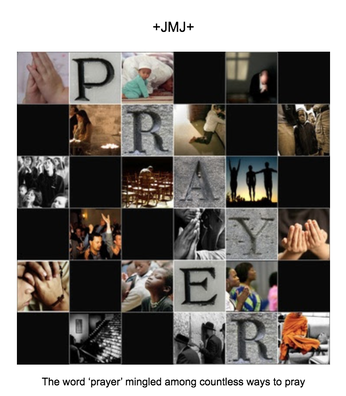

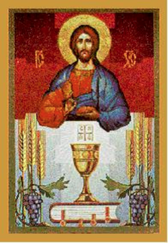

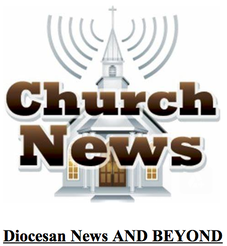

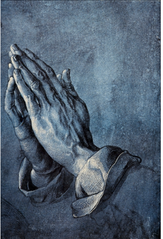
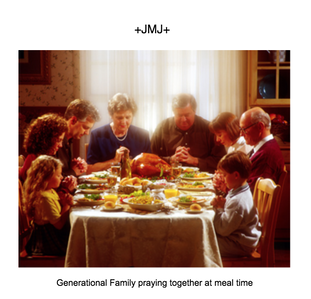
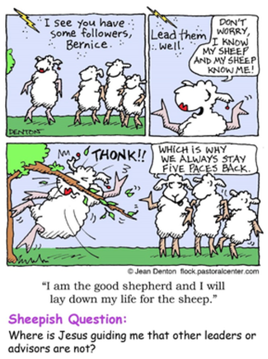

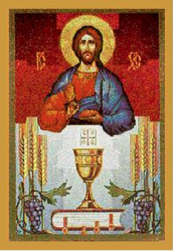

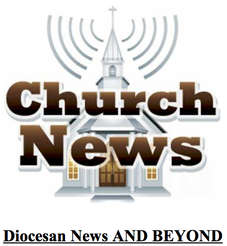





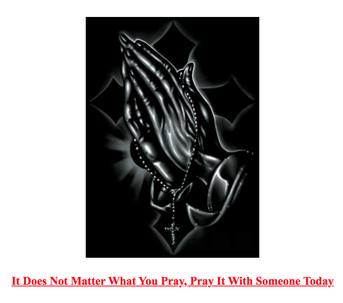
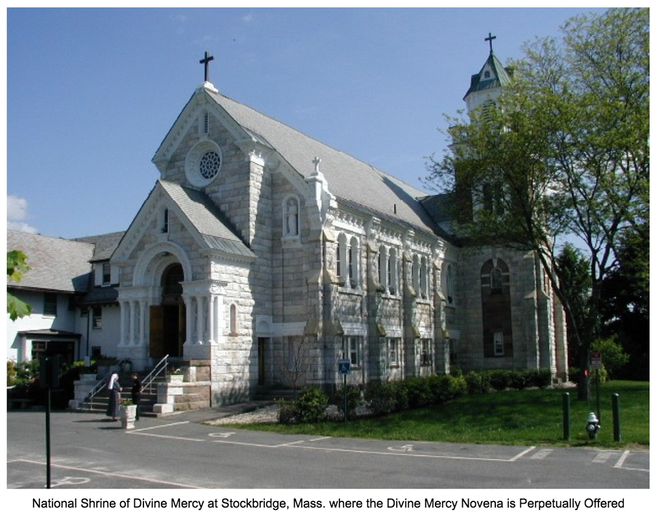
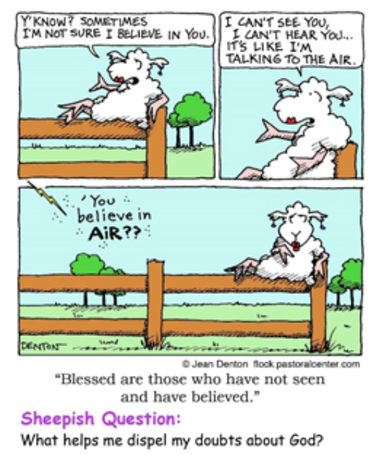

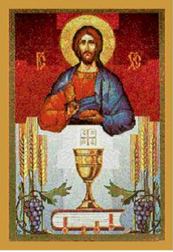
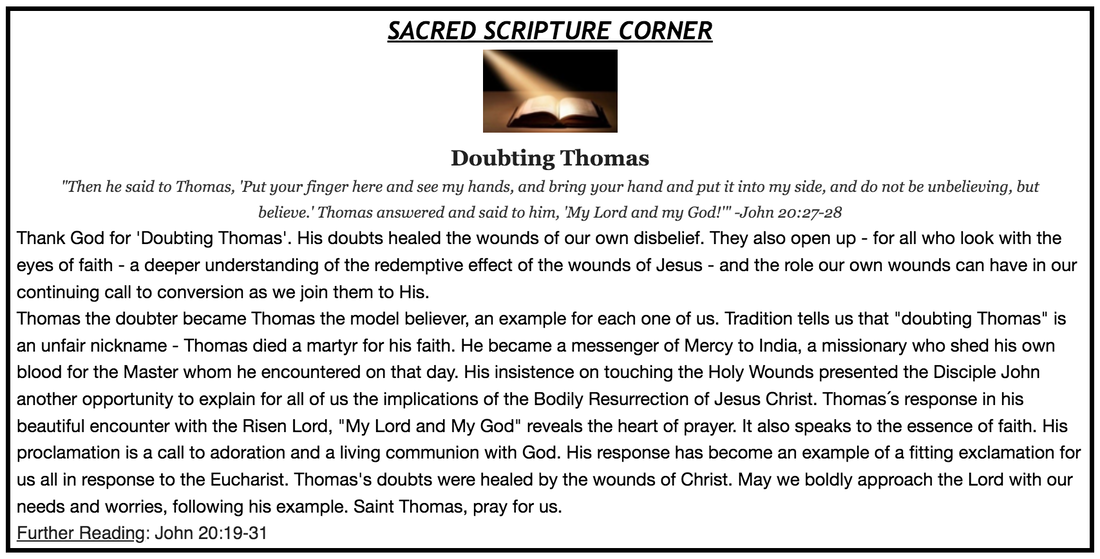


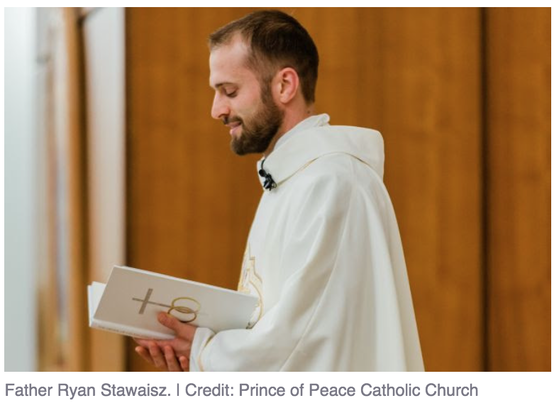

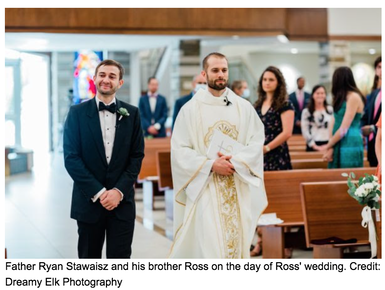
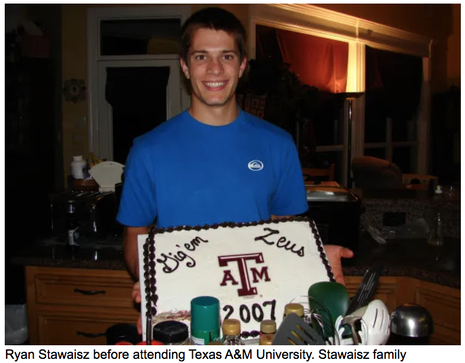
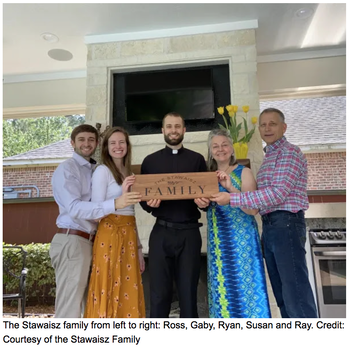
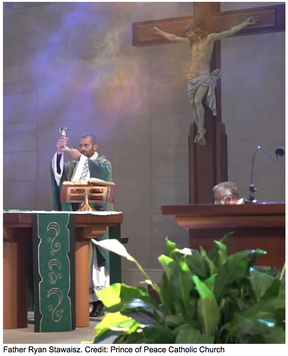
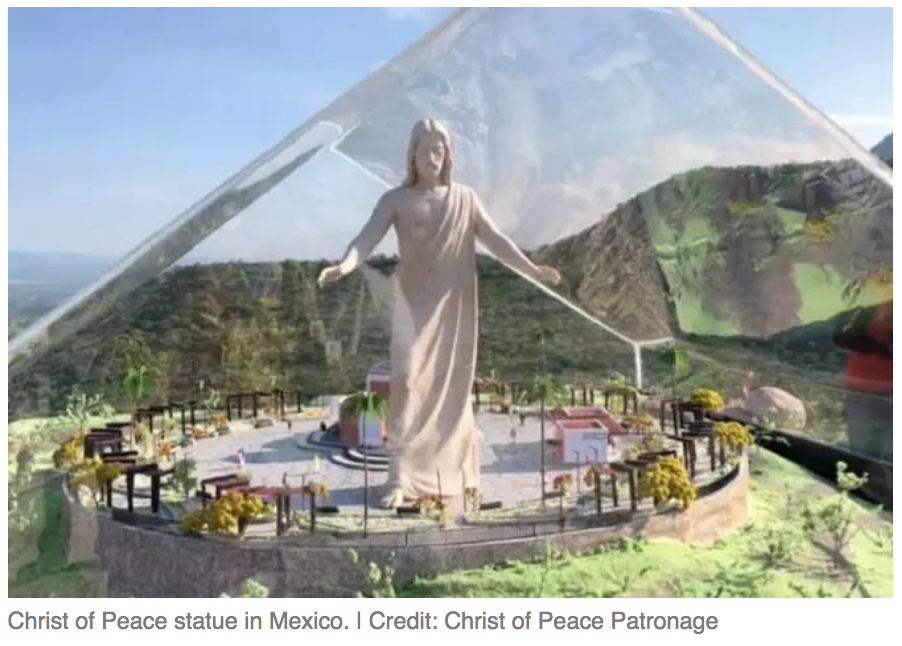
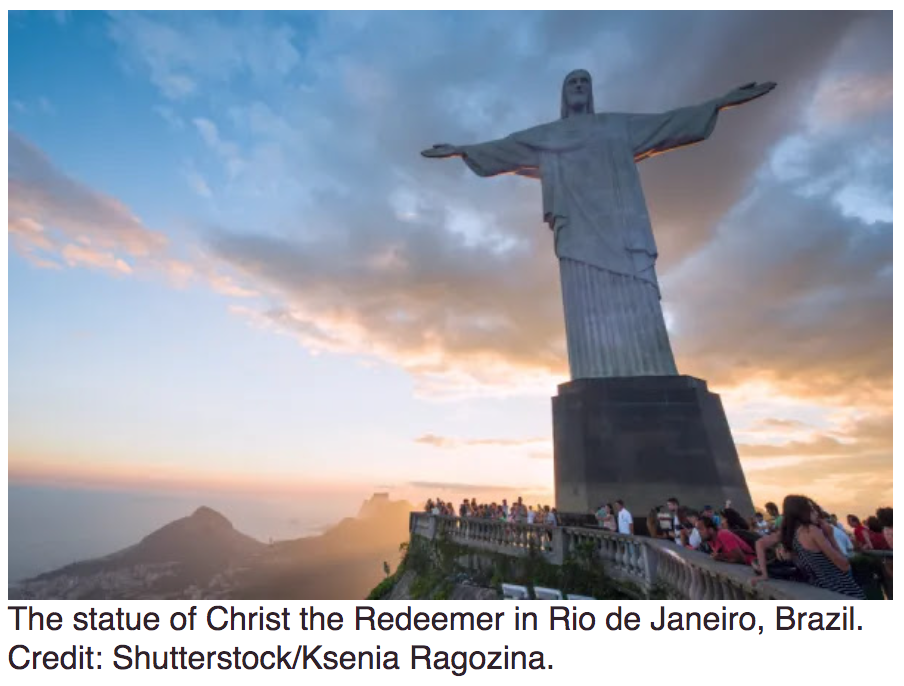
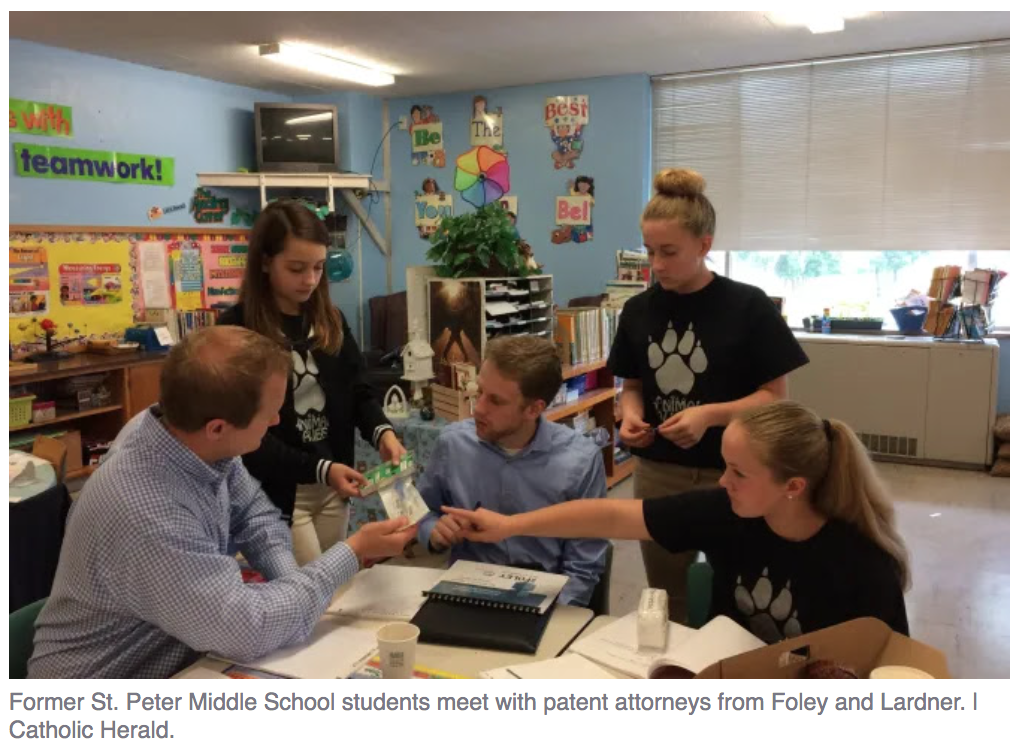
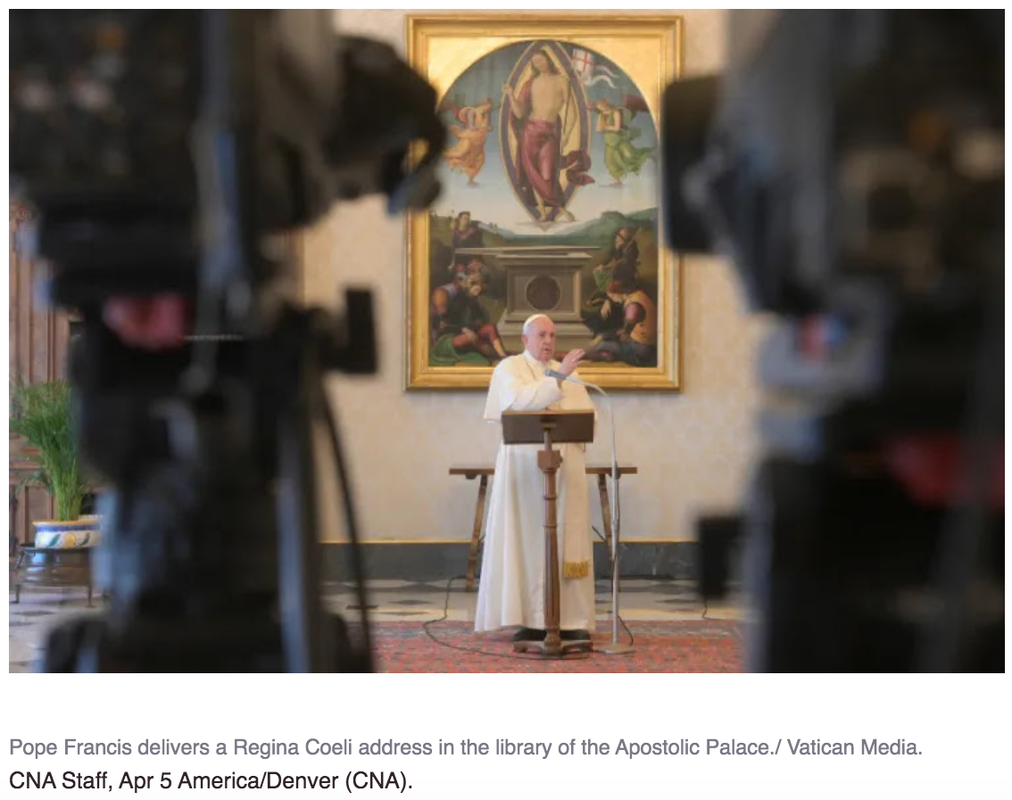

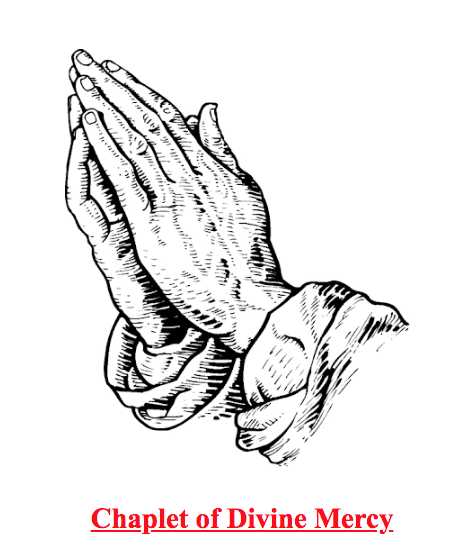
 RSS Feed
RSS Feed
